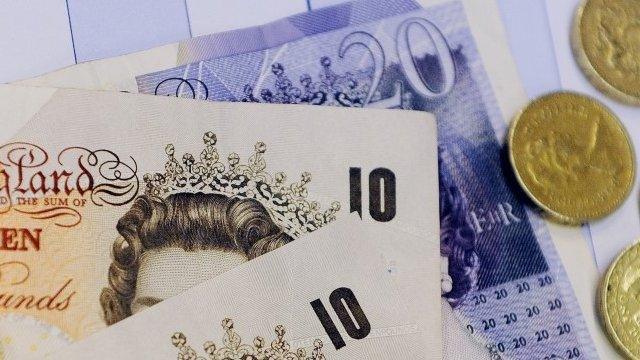Election 2015: Voters 'left in the dark', says IFS
- Published
- comments
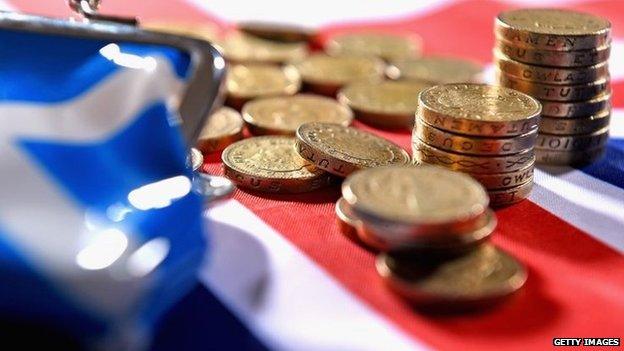
Four of the major parties have not provided "anything like full details" on plans to cut the deficit, the Institute for Fiscal Studies has said.
"Broad outlines" of the choice on offer were on show, it said, but voters were "somewhere in the dark" over cuts planned by the main UK parties and SNP.
The Conservatives would have to cut services and Labour borrow £26bn a year, the independent body suggested.
It said the difference between the two approaches was the biggest since 1992.
The two largest parties again attacked each other's economic plans.
The Conservatives said a Labour government backed by the SNP would be "deeply unstable", as Labour said the Tories planned "the biggest cuts in the developed world".
In other election news:
The coalition received a pre-election boost with official figures showing it beat its target for reducing annual public sector borrowing for the latest financial year
The Liberal Democrats pledged a £150m support package for carers
SNP leader Nicola Sturgeon said her party would prop up a minority Labour government even if the Conservatives had a 40-seat lead
An east London election was declared void and will have to be re-run after the mayor was found guilty of corrupt and illegal practices
The head of the UK's returning officers' organisation said the number of uncontested seats at some local elections has reached "epidemic proportions"
The IFS report, external comes after it analysed each of the party manifestos.
The think tank's deputy director Carl Emmerson said: "There are genuinely big differences between the main parties' fiscal plans.
"The electorate has a real choice, although it can at best see only the broad outlines of that choice."
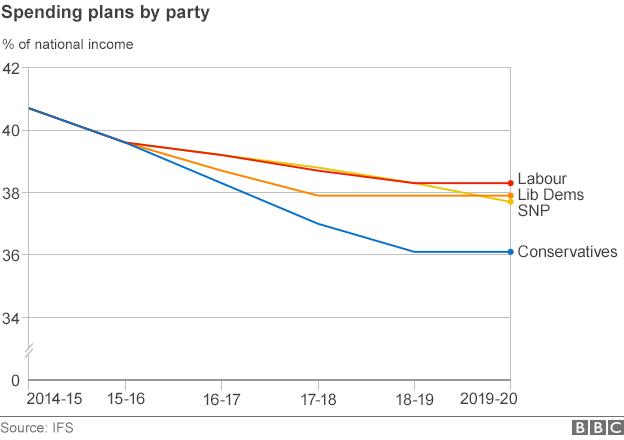

The analysis found Conservative plans for the next Parliament involve "a significantly larger reduction in borrowing and debt than Labour plans", Mr Emmerson said.
But the report said that was based on "substantial and almost entirely unspecified spending cuts and tax increases" and could involve "further real cuts to unprotected departments of around £30 billion".
Labour had been "considerably more vague" about how much it wants to borrow, the report said.
'Longer period'
It added that the Liberal Democrats had been more transparent about overall plans to 2017-18, saying they were aiming for tightening spending more than Labour but less than the Conservatives.
And it said the SNP's figures imply the same reduction in borrowing as Labour, although the reduction would be slower.
This means the party is proposing a slower but longer period of austerity, the think tank said.
The report said of the SNP: "Their stated plans do not necessarily match their anti-austerity rhetoric."

Analysis: BBC experts
Political editor Nick Robinson
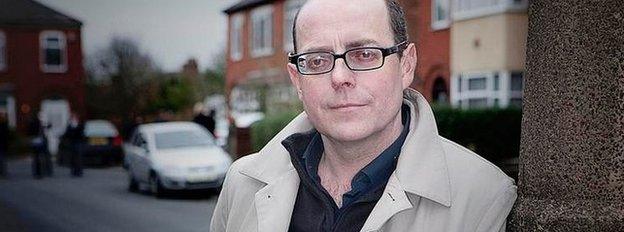
Forget the dizzying list of stats - the millions, billions and percentages - for just a moment. Forget those clever folk at the Institute for Fiscal Studies.
Focus instead on what has been missing from this election campaign so far. That is the scale of the choice the electorate are facing. A choice that has been masked by deliberate evasiveness and obfuscation on all sides, by vague ambitions dressed up to sound hard and specific and, above all, by the political cross-dressing of the two big parties.
Read more on Nick's blog.
Economics editor Robert Peston
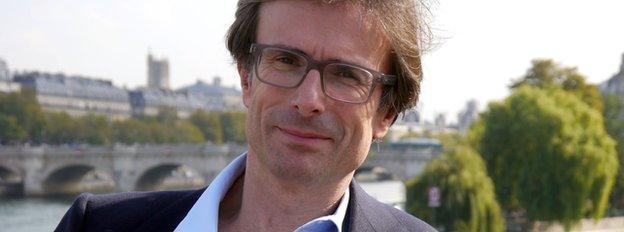
The economic choice confronting voters is the starkest since 1992. That is the assessment of the Institute for Fiscal Studies of the main parties' deficit reduction plans.
The best way of seeing this choice is that, if the Tories and Labour deliver their plans, the national debt by 2020 would be £90bn lower in today's money under the Conservatives, but cuts to so-called unprotected government departments would be just £1bn under Labour compared with £30bn under the Tories.
Read more on Robert's blog.

IFS director Paul Johnson told the BBC the differences between the Labour and Conservative approaches were "probably the biggest since at least 1992, and definitely bigger than the difference that we saw back in the 2010 general election".
Chancellor George Osborne said: "People know from us we have a balanced and clear plan to eliminate the deficit, to invest in our National Health Service and to make work pay for working people, which is exactly what we have done over the last five years."
He said the IFS report showed Labour would borrow £90bn more.
But Labour leader Ed Miliband rejected that part of the analysis.
Instead, he accused the Conservatives of engaging in a "grand deception", adding: "As the Institute for Fiscal Studies has today confirmed, the Tories are committed to extreme spending plans. And they have also confirmed that Britain would be facing the deepest cuts of the next three years of any advanced country in the world."
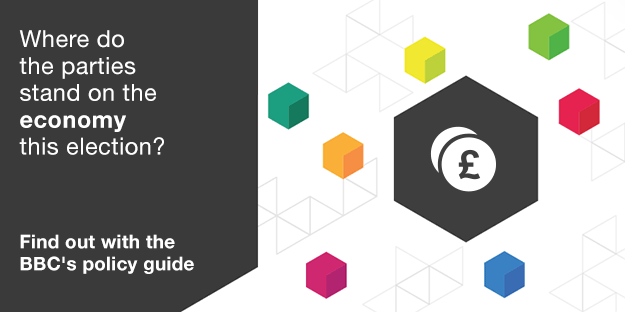
Q&A: Economy backgrounder - all you need to know
Liberal Democrat David Laws said the IFS had said "we get the tick for being more transparent clearly than the other political parties".
He told the BBC News Channel: "We've set out in more detail than any other party I think in British political history what we'd do on tax, what we'd do on welfare, what we'd do on spending, which areas would be protected."
Scotland's Deputy First Minister John Swinney confirmed the SNP's plans to reduce the deficit "would take longer to achieve".
He added: "We're going to invest right away to make sure we have the necessary resources to end austerity and to start improving our public services."
A UKIP spokesman said the decision by the IFS not to examine its policies was "testament" to its decision to have its manifesto looked at by the independent Centre for Economics and Business Research.
The BBC's James Landale: "In the end it comes down to trust. Which party do the voters trust most on the public finances"
Ahead of the publication of the IFS assessment, Mr Osborne told Today he "did not accept" the Tory campaign had too negative a focus.
He said: "The vast bulk of our campaign is promoting the positive - today we are setting out more of our plans for working people in different parts of the regions."
But he also repeated warnings about SNP influence on a Labour minority government.
'Real cost'
Labour has ruled out a formal coalition with the SNP if it falls short of a majority on 7 May, but the Conservatives say there could be a looser arrangement with Labour relying on SNP support to win Commons votes.
The chancellor used an interview in the Daily Telegraph, external to cite a Treasury estimate of the SNP's spending plans that said they would trigger an extra £6bn in debt interest payments.
Labour called the chancellor's comments "ludicrous" and said they were "based on old figures".
Labour highlighted an analysis, external from the International Monetary Fund, claiming it showed Conservative cuts planned for the next three years would be "bigger than anywhere else among the world's 33 advanced economies".
Mr Miliband claims that spending cuts outlined in last month's Budget would be "double the pace next year than this year".
And he told supporters the Conservative plan was "so extreme that far from protecting the NHS they would end up cutting the NHS".
"It is a plan so extreme that it wouldn't mean three years of the good life, it would mean three more years of the hardest of times."
- Published23 April 2015
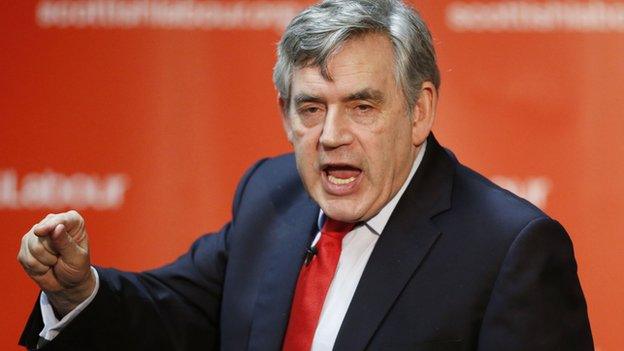
- Published22 April 2015
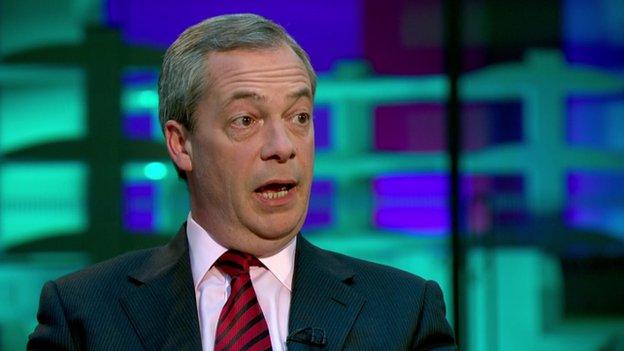
- Published23 April 2015
